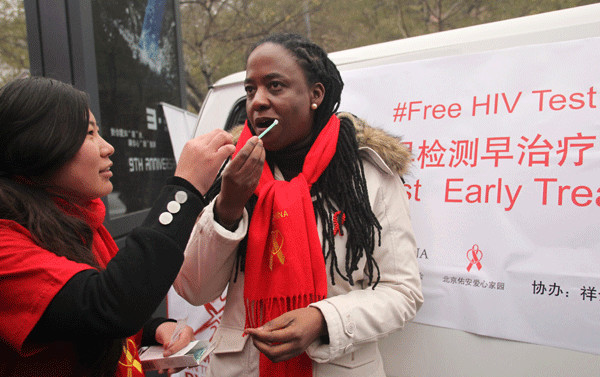

Catherine Sozi, UNAIDS country director of China, takes a rapid test for HIV/AIDS on Saturday in Beijing during a campaign to mark World Aids Day, which falls on Dec 1 every year. Volunteers also provide information and tools to fight the disease. Zou Hong / China Daily
Experts in HIV/AIDS hope to widen the coverage of healthcare and extend life expectancy.
China's top health authorities are mulling fine-tuning the guidelines for HIV tests next year to ensure that people with the disease can begin antiretroviral treatment as early as possible, and attain life expectancies similar to those of healthy people, the country's leading HIV/AIDS specialist has said.
Wu Zunyou, head of the National Center for AIDS/STD Control and Prevention, made the remarks on Saturday at a media event ahead of World AIDS Day, which falls on Dec 1.
Thirty years into the epidemic, "the current treatment, if started early, could prolong sufferers' life expectancy to almost the same as that of healthy people, but we still see patients too late to treat and die from AIDS", Wu said, adding that early treatment also helps with preventative work because ART lowers the patient's HIV viral load.
In response, the National Health and Family Planning Commission issued new treatment guidelines in April, requiring ART for patients whose CD4 count falls below 500. Before the new guidelines the figure was 350. CD4 cells are white blood cells that help fight infection, with a range of 500 cells per cubic millimeter of blood in HIV/AIDS patients to 1,200 cells in healthy people.
Wu Hao, director of the department of infectious diseases at the You An Hospital in Beijing, said that 80 percent of patients who start their treatment late, with a CD4 count below 500, will suffer an impaired and irreversibly low level of immunity.
To improve the chances of early treatment, Wu's department has been piloting a new testing strategy that offers gay men with AIDS/HIV a course of ART after two so-called rapid tests - usually conducted with dipsticks or swabs - both confirm that the patient is HIV-positive, he said.
The pilot is supported by the AIDS Healthcare Foundation, one of the largest NGOs for AIDS treatment and care in the world. Founded in Los Angles in 1987, the AHF has so far provided medical care to more than 30,000 AIDS patients in at least 20 countries, including China.
Rapid tests can indicate a person's HIV status within 10 minutes, and the test kit is widely available at both brick and mortar and online drugstores.
However, most treatment sites in China offer ART only after lab-based confirmation, but "that can take as long as six months in some remote areas", said Wu Hao.
Copyright ©1999-2018
Chinanews.com. All rights reserved.
Reproduction in whole or in part without permission is prohibited.